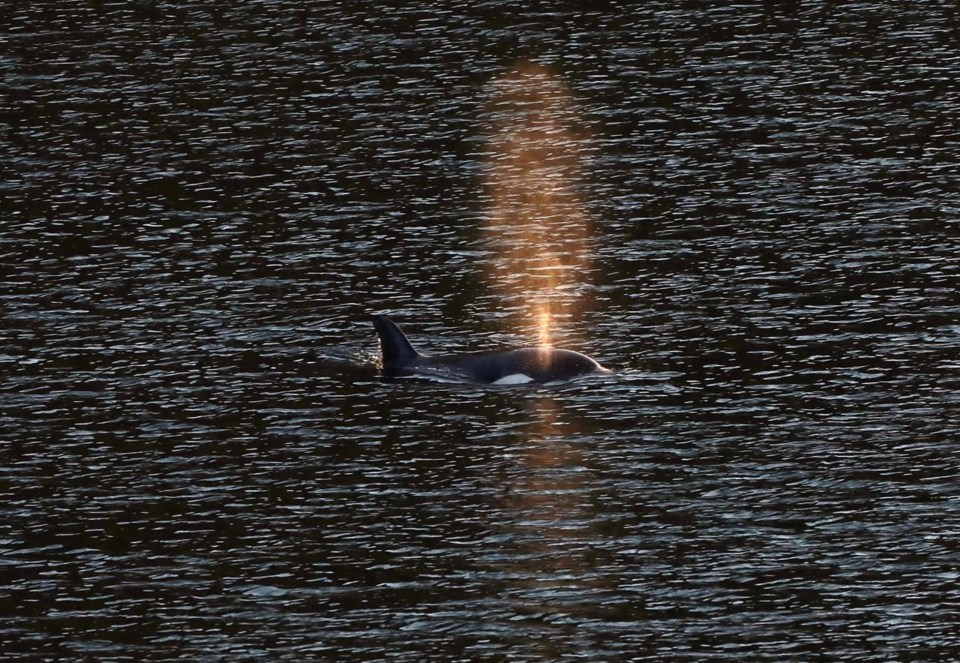ZEBALLOS, B.C. — A rescue operation for an orca calf trapped in a remote tidal lagoon off Vancouver Island has been put on hold after it started eating seal meat thrown in the water for what is believed to be the first time.
Ehattesaht First Nation Chief Simon John said the young killer whale swam to an area of the lagoon where members of the neighbouring Nuchatlaht First Nation tossed about 18 kilograms of seal meat into the water on Thursday evening.
They witnessed her grabbing the chunks in its mouth and diving below the surface. A video of the encounter was posted on Facebook.
"It was joy, really," said John about the orca's consumption of the seal meat. "It was what she needed. It's the first time we've confirmed it. It brings us a little more comfort, for sure."
Veterinarians have been closely monitoring the two-year-old whale for any signs of failing health and to see if she is feeding in the lagoon, 450 kilometres northwest of Victoria.
She's been trapped alone for four weeks since her mother was beached at low tide and died.
An initial attempt last Friday to corral the 700-kilogram orca so rescuers could take her to the open ocean failed when the calf refused to leave the deep parts of the lagoon.
John said the young orca's decision to eat the seal meat, the preferred food of Bigg's killer whales, will likely give the rescue team more time to prepare another rescue attempt.
"We're looking at maybe a week," he said, adding the First Nation will continue to try and feed the whale. "I think it is a good time for a rest."
Paul Cottrell, a Fisheries Department marine mammal co-ordinator, said the whale feeding gave the rescue team more options and time.
"We're really happy this is happening," he said. "This is all good news. We're really happy."
He said the rescue team may now employ a "carrot option" to coax the orca to a shallow end of the lagoon or perhaps even out under the bridge leading to the open ocean by using seal meat as an attractant.
"It really is up to our female calf to see how she responds," said Cottrell. "It gives us optimism.
He said the rescue team was prepared to deploy Friday but was stood down after the calf ate the seal meat.
Cottrell said health concerns for the calf, particularly changes in body condition near its blow hole, had been concerning veterinarians.
A seine netting vessel arrived in Zeballos, B.C., ahead of the second planned rescue operation for the whale, which has been named kwiisahi?is, or Brave Little Hunter by the Ehattesaht First Nation.
John said the Indigenous seine boat crew from the Campbell River area and other rescue members were sent home Friday after the rescue was put on hold.
The First Nation has said the rescue operation has been very expensive for the band.
In Victoria on Friday, Prime Minister Justin Trudeau said he has ensured that the Fisheries Department reached out to the community and it will continue to engage with the nation.
"I think we're all following this story attentively. It is heartbreaking and we're all worried," he said.
John said he was pleased Trudeau expressed concern for the young orca and supported the rescue effort.
"I'm really appreciative of the prime minister," he said.
He didn't elaborate on costs of the rescue effort or the nation's decision to start a Go Fund Me campaign to help cover expenses.
The feeding video posted on Facebook shows the young orca surfacing and circling near shore as a person chants, "Hello kwiisahi?is, hello kwiisahi?is."
After one chunk of meat splashes down in the water, the whale quickly plucks it from the surface, then dives away.
"She got it! Good girl," says one observer.
In a second scene, the whale takes a piece of meat floating still on the surface.
This report by The Canadian Press was first published April 19, 2024.
Dirk Meissner, The Canadian Press



